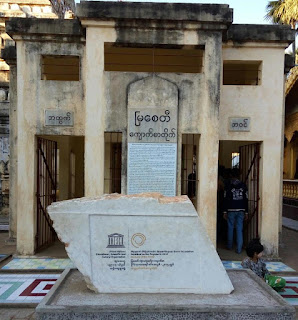4. Verb (ကြိယာ) (၁)
ကတ္တား၏ ပြုခြင်း၊ ဖြစ်ခြင်း၊ ရှိခြင်း၊
ခံရခြင်းကို ဖော်ပြသည့် စကားလုံးဖြစ်သည်။ လုပ်ဆောင်မှု၊ ဖြစ်တည်မှု၊ တစ်ခုခုဖြစ်နေမှုတို့ကို
ဖော်ပြသလို ဝါကျဖွဲ့ရာတွင်လည်း မပါမဖြစ် အရေးပါဆုံးဖြစ်သည်။ Verb (ကြိယာ) (၄) မျိုး
ရှိပါသည်။
(1)
Verb to be
(2)
Verb to have
(3)
Verb to do (Action Verb)
(4) Helping Verb (Auxiliary Verb or Model Verb)
(1)
Verb to be ဆိုသည်မှာ (am, is, are, was, were, be, been, being) တို့ ဖြစ်သည်။
Verb to be ၏ နောက်ကလာသော စကားကို (Completement) ဖြည့်ချက်ဟု ခေါ်သည်။ Verb to be
ကို (Adjective) နှင့် တွဲလိုက်လျှင် (Verb) ဖြစ်လာသည်။
Eg:
I am an author.
She
is a journalist.
We
are Myanmar.
(2)
Verb to have ဆိုသည်မှာ (has, have, had) ဖြစ်သည်။ (has, have, had) ကို “ မှာရှိသည် ” ဟူသော အဓိပ္ပါယ်နှင့် ပိုင်ဆိုင်မှုပြအဖြစ်သုံးနိုင်သည်။
(has, have, had) ကို “ စားသည်၊ သောက်သည် ” ဟူသော အဓိပ္ပါယ်နှင့် ( eat, drink ) ကိုယ်စား
Verb to do အဖြစ်လည်း သုံးနိုင်သည်။
Eg:
She has two children.
I
have some books for you.
I
had read about Buddhism.
(3)
Verb to do ဆိုသည်မှာ ( do, does, did) သာမက ကိုယ်စိတ်နှစ်ပါ း လှုပ်ရှားလုပ်ဆောင်မှုကိုပြသည့်
စကားလုံးအားလုံးကို ခေါ်ခြင်း ဖြစ်သည်။
Eg:
drink, eat, fight, go, hit, etc …
Thuta
drinks a glass of water.
Kaung
Zayar eats a slice of cake.
Soldiers
fight enemy.
***(Do,
does, did) တို့ကို မေးခွန်းဝါကျ၊ အငြင်းဝါကျ ပြောင်းသည့်အခါ သုံးရသည်။
***(Do,
does, did) တို့ကို သုံးလျှင် (Verb) သည် (V1)
ရိုးရိုး ဖြစ်ရမည်။
***(Do,
does, did+V1)
Eg:
Do you always go to the library? (go = V1)
Does he read his notebook on time? (read = V1)
Did you see a plane yesterday? (See = V1)
(Verb to do) ကို Transitive Verb
(Vt) နှင့် Intransitive Verb (Vi) ဟူ၍ (၂)မျိုး ခွဲခြားနိုင်သည်။
(1)
Transitive Verb (Vt) - ကံလို ကြိယာ (Objective တိုက်ရိုက်လိုက်ရသည်။)
(2)
Intransitive Verb (Vi) - ကံမလို ကြိယာ (Objective တိုက်ရိုက်လိုက်ရန် မလိုဘဲ
Preposition တစ်ခုခု ထည့်ပေးရသည့် ကြိယာဖြစ်သည်။)
Eg:
Father beats Ko Kaung.
(ဖေဖေရိုက်သည်မှာ
မည်သူ့ကိုဆိုသည့် ကံလိုသည့်အတွက် beats သည် (Vt) ကံလိုကြိယာ ဖြစ်သည်။)
Ko
Kaung plays the game.
(ကိုကောင်း
ကစားသည်မှာ ဂိမ်း ဖြစ်ကြောင်း ကံလိုသည့်အတွက် plays သည် (Vt) ကံလိုကြိယာ ဖြစ်သည်။)
Mother
goes to
market.
(အမေသွားသည်မှာ
ဈေးကို ဆိုသည့် (to)နေရာပြပုဒ်ပါသည့်အတွက် (goes) သည် (VI) ကံမလို ကြိယာ ဖြစ်သည်။)
She
looks at
me.
We
come from
Monywa.
(မုံရွာမှ
ဆိုသည့် (from) နေရာပြပုဒ်ပါသည့်အတွက် (come) သည် (VI) ကံမလို ကြိယာ ဖြစ်သည်။
(4)
Helping Verbs (Auxiliaries) များမှာ (can, could, will, would, shall, should,
may, might, must, ought to, used to, need (not), dare (not), … တို့ ဖြစ်သည်။ အမြဲတမ်းပင်
(V1) နှင့် တွဲသုံးရသည်။
Eg:
Ma Nan Yu can write short stories very well.
Ko
Nyein Chan Thar could always play chess with his friends.
Shall I call
a doctor for you?
You
should go
to a clinic.
ထူးအောင်ဝင့်
ပြီးခဲ့သည့်အပိုင်း
ဖတ်ရှုရန်
https://web.facebook.com/authorhtooaungwint/posts/4972339116149949



Comments
Post a Comment